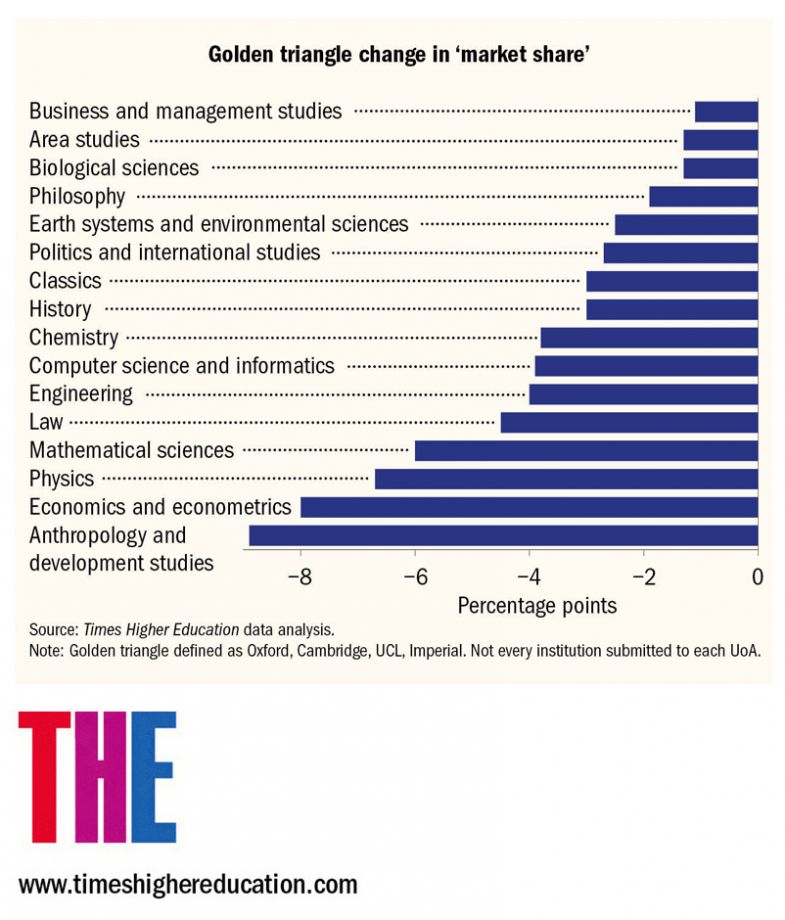Elite research institutions in the golden triangle of London, Oxford and Cambridge look set to lose significant shares of funding in some subject areas, according to an analysis of REF 2021 unit of assessment results.
In 23 out of 34 disciplinary areas, golden triangle institutions that submitted to the exercise lost market share, with the drop being worth more than 5 percentage points in four areas.
Market share was calculated in Times Higher Education’s data analysis using a similar method to England’s current formula for quality-related funding, which takes account only of research rated 4* and 3* and gives the former a quadruple weighting.
Based on this, and defining the golden triangle as the universities of Oxford and Cambridge, Imperial College London and UCL, the group lost an 8 percentage point share of potential funding in economics and econometrics, 6.7 points in physics and 6 points in mathematical sciences. The group also loses a four-point share in some major STEM areas including computer science, engineering and chemistry.
The loss of share in some of these disciplines is mainly mitigated once the whole Russell Group is taken into account, suggesting that some large research-intensives outside the golden triangle performed relatively well compared with 2014.
At the same time, institutions outside the Russell Group, taken together, gained market share in some areas compared with 2014, notably economics (6.4 percentage points), computer science and engineering (both 3.4 points).
Kieron Flanagan, professor of science and technology policy at the University of Manchester, said a key question around the REF 2021 results would be how the government reacted to “excellent” research appearing to be found more uniformly across the institutional spectrum.
He pointed out that shortly after the 2014 REF, when research budgets were tight, the formula that uses the REF results to allocate quality-related funding was “fudged” to “make sure that it didn’t take money away from the golden triangle”, something that was part of a “long-term strategy” to concentrate scarce resources.
“So the interesting political question really is will the QR [funding] envelope increase to allow either for the formula to stay the same or to be relaxed even a little bit? Or will there be another tightening of the screws” and bid to concentrate funding?
“Will the levelling-up agenda win out or will the ‘we can’t possibly damage Oxbridge’ agenda win out?”
But Dominic Dean, the REF academic manager for the University of Sussex, speaking in a personal capacity, said he thought that the increased spread of results provided an opportunity that would be difficult to pass up.
“I hope that tinkering with the QR formula to protect a perceived ‘elite’ set of institutions would be unlikely given that the relative spread of results gives an opportunity for some rebalancing and is in line with the geography of the government’s own ‘levelling-up’ agenda,” he said.
simon.baker@timeshighereducation.com

POSTSCRIPT:
Print headline: Less lustre: Golden triangle to lose cash for key areas
Register to continue
Why register?
- Registration is free and only takes a moment
- Once registered, you can read 3 articles a month
- Sign up for our newsletter
Subscribe
Or subscribe for unlimited access to:
- Unlimited access to news, views, insights & reviews
- Digital editions
- Digital access to THE’s university and college rankings analysis
Already registered or a current subscriber? Login








